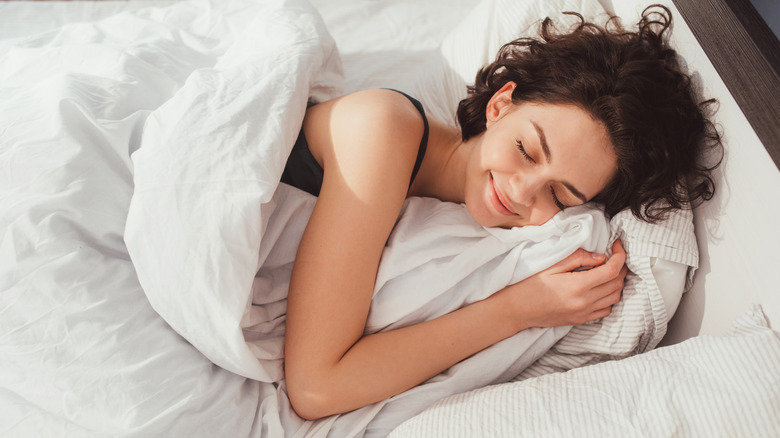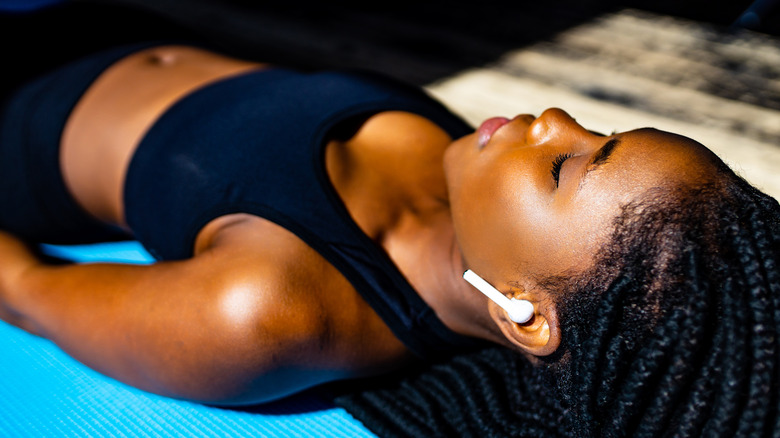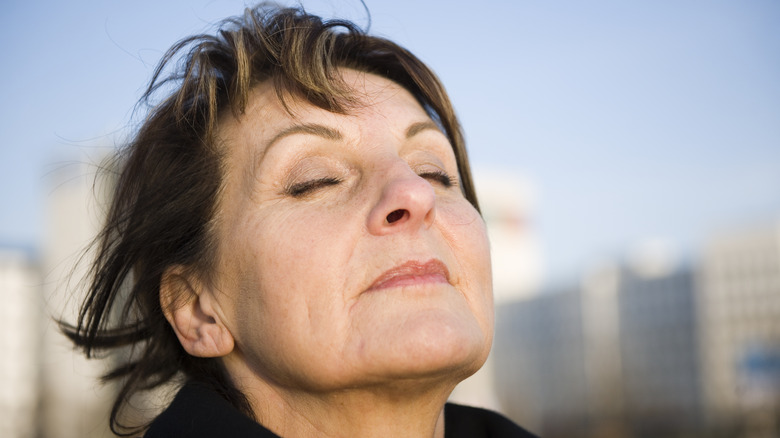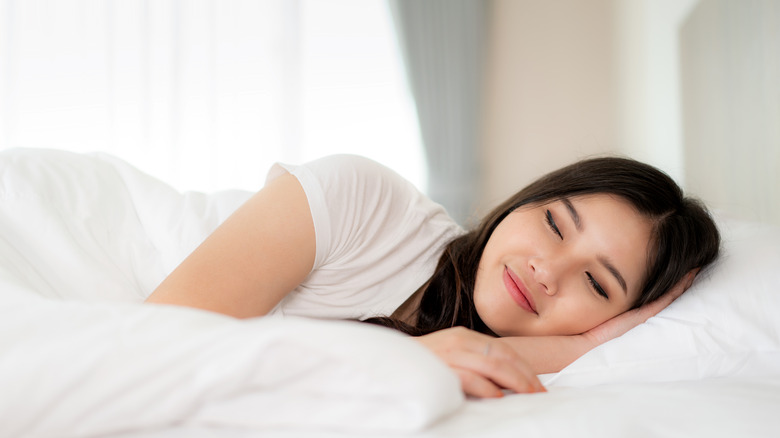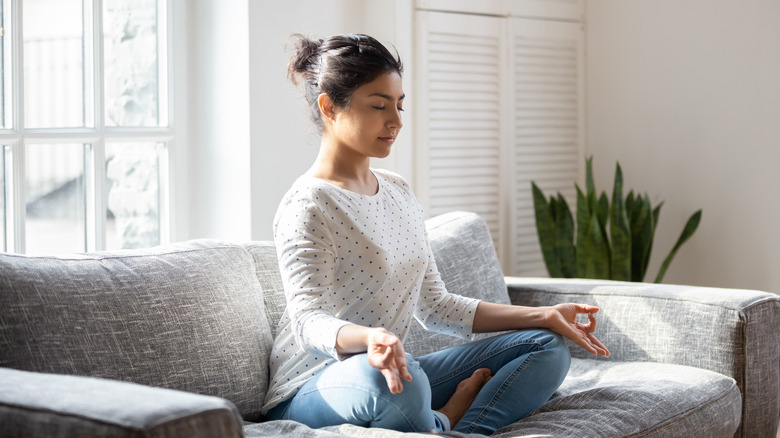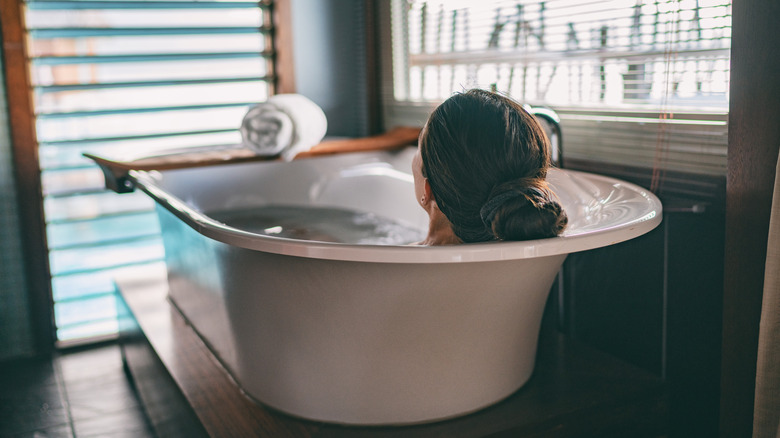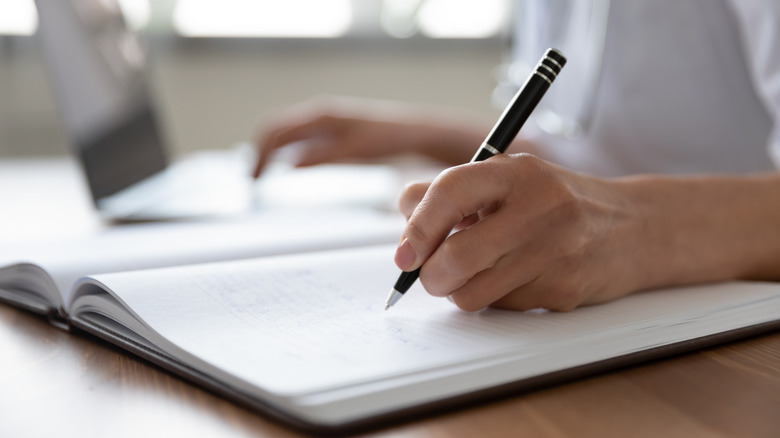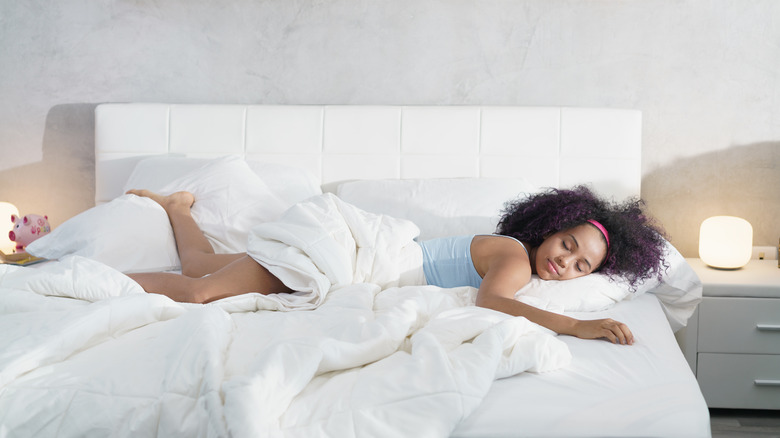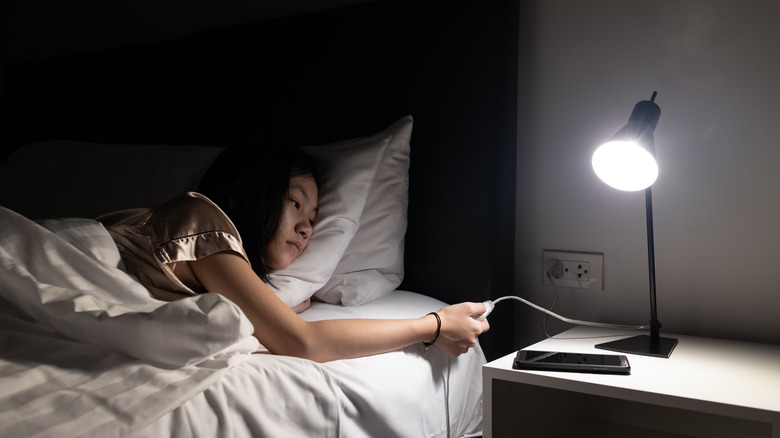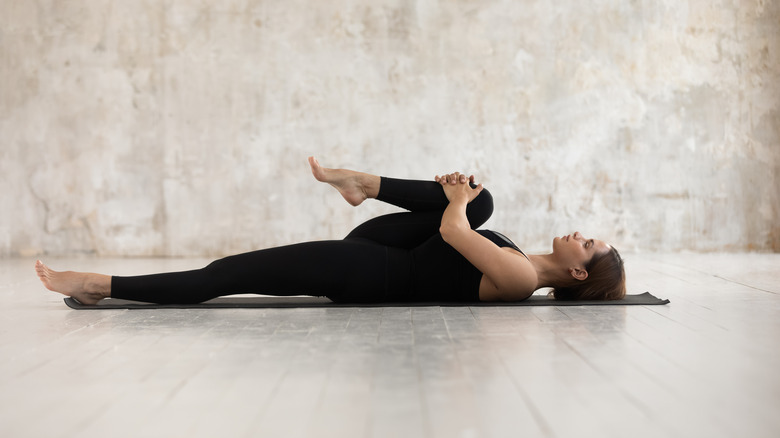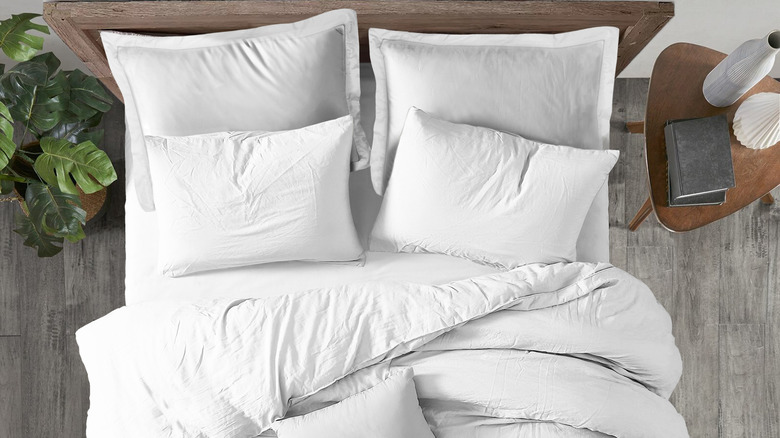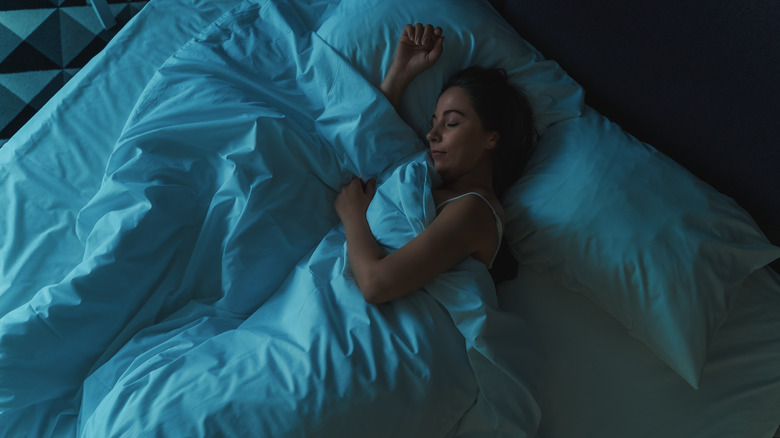Oddly Satisfying Things That Will Relax You Before Going To Sleep
Sleep is seriously underrated. Derided by workaholics and party animals alike as a boring waste of time, sleep has gotten a bad rap in some circles as an activity for babies, old people, sad sacks, and the sick. But, while Bon Jovi famously asserted that you can "sleep when you're dead," the truth is a lot more sobering. According to The New York Times, if you don't sleep regularly and well, you may well be on your way to dead, and a lot sooner than you think.
Insufficient sleep leaves you more vulnerable to illness and contributes to anxiety, depression, and weight gain. And, as anyone who's ever pulled an all-nighter can attest, missing a night of sleep feels pretty miserable. Even worse, because sleep deprivation dulls your memory, slows your reaction times, and alters your behavior, it can contribute to accidents — or just plain old bad decisions.
But, for a lot of us, getting a good night of sleep can be a challenge. After a full day running on all cylinders, many of us are exhausted, but too wired to settle down. Or, we're too stressed worrying about what's going to happen tomorrow. It doesn't have to be this way. There are numerous simple, safe — and surprisingly satisfying — steps you can take to ensure you don't spend your nights tossing and turning.
Focusing on your body is oddly calming
If your mind won't stop racing after you turn out the lights, the Sleep Foundation suggests a surprising way to slow it down: contemplating your individual body parts. This is a form of meditation known as a body scan, and it sounds like exactly what it is: a quiet activity in which you focus your attention on each part of your body in turn (for instance, the top of your head, then your eyes, then your ears and jaw, mentally working your way downward). As Mindful instructs, be conscious of how each part feels as you focus on it. What sensations do you feel? What surfaces are your different body parts touching?
One thing you'll almost certainly notice as you start practicing body scans is that your mind will start to wander — so instead of calmly contemplating your navel, you may find yourself stressing out about that work deadline. This is normal and, if it happens, simply notice that it's happened and gently redirect your thoughts back to your body. By doing this repeatedly, you'll train your mind to stop racing and train yourself to take control of and quiet your thoughts if you find yourself stressing out. If you do this before bed, sleep will come much more easily.
Taking really deep breaths feels great before bed
Another simple activity to help you fall asleep is one you already do all the time: breathing. But not just any breathing — according to the Sleep Foundation, slow, deep, deliberate breathing is the ticket for calming your body and mind to prepare you for sleep. Like meditation, deep breathing focuses your attention and destresses your system. It's no coincidence that we tell our panicked or overly excited friends to slow down and take deep breaths.
According to the Sleep Foundation, simply breathing slowly and intentionally will do the trick. You can also practice structured breathing exercises, such as box breath, whose calming effect is so powerful it's said to be used by Navy SEALS in fight-or-flight mode, according to The New York Times. Luckily, you don't need the coordination or strength of a Navy SEAL to do it effectively: just lie on your back with your eyes closed and your hands resting on your belly. Inhale deeply through your nose while counting to four. Hold your breath for another count of four, then exhale fully to a count of four. Count to four before inhaling again. If it helps, you can visualize each of these four steps as a side of a square box that you can draw in your mind as you do this exercise.
Talking to yourself before sleep will quiet your mind
At the end of a busy day, it's sometimes hard to switch gears and give yourself permission to just chill so you can finally get some well-deserved sleep. When this happens, there's a surprising solution: talk yourself into feeling relaxed and sleepy. This proven technique of self-suggestion, officially called "autogenics," is similar to a body scan. But, instead of just focusing on each part, according to Houston Family Psychology, you mentally recite and repeat a calming statement directed at that part, such as, "My arm feels warm" or "My foot feels heavy." As you do this, imagine feeling that sensation in that body part. But, don't feel that you have to force yourself to feel anything — according to Houston Family Psychology, it's fine if you don't feel anything special, and you don't need to for the exercise to have a relaxing effect.
Skeptics may think autogenics sounds like New Age quackery, but it's a widely accepted practice and, according to Brigham Young University, has been shown to reduce tension, high blood pressure, irritability, and migraines.
Mellow out with melatonin supplements
If insomnia is a frequent problem for you, you may be tempted to go straight for the heavy artillery and get some sleeping pills. But, while occasional use of tranquilizers or prescription antidepressants can be safe, it's not without risk. These medications can interact with other medications, cause dizziness and headaches, exacerbate kidney and liver problems, and potentially lead to dependency, according to the Mayo Clinic.
A safer, non-addictive option to consider is melatonin supplements. As The New York Times explains, melatonin is a hormone naturally secreted at night, typically in response to darkness. It contributes to sleepiness by lowering one's core body temperature and reducing alertness. So, if you're having trouble falling asleep or staying asleep — or if your sleep cycle has been thrown off by jet lag or changes in your schedule — over-the-counter melatonin supplements can help you get back on track.
But, like any other medication, melatonin supplements should be used with caution. The amounts of melatonin in supplements can vary widely between brands — which is why the Johns Hopkins Center for Sleep recommends that you find a brand that works for you and use it consistently. The New York Times recommends taking the smallest dose needed (0.5 milligrams for sleep regulation problems or five milligrams for insomnia) and avoid using heavy machinery within five hours of taking melatonin. And, if you have any chronic health issues, consult with your doctor before taking melatonin.
Tensing — then relaxing — individual body parts will prime you for sleep
It may sound counterintuitive, but according to the Sleep Foundation, a surprisingly effective way to relax your muscles to prepare them for sleep is to tense them up first. The practice of progressive muscle relaxation, developed in the 1930s as a technique for promoting mental calmness, according to WebMD, involves systematically tensing, then relaxing, different muscle groups until all muscles have been worked. This practice is not only recommended as an antidote to insomnia, but as a way to help alleviate headaches, high blood pressure, cancer pain, and digestive issues.
How do you do progressive muscle relaxation? First, get into a comfortable position (lying in bed or sitting). Mentally chart the muscle groups you plan to target, and starting from one end of your body, inhale while tensing the first muscle group (for example, your feet) for 5 to 10 seconds. Exhale and immediately relax the tensed muscles, then stay relaxed for 10 to 20 seconds before continuing to the next group (in this case, your lower legs). As you progress, note how different your muscles feel after being tensed and relaxed. As WebMD notes, regular practice of progressive muscle relaxation will put you in better tune with your body, enabling you to identify and stop signs of stress before they get out of control.
Chill out by warming up
For many of us, nothing signals a good night of sleep like a warm bed with a pile of cozy blankets. So, you may find it surprising that our body temperature actually drops before bedtime. According to The New York Times, one of the functions of the sleep hormone, melatonin, is to lower one's body temperature in preparation for sleep. This means that if you're having trouble falling asleep, taking measures to lower your core body temperature may be in order.
And there's a surprising — and wonderfully satisfying — way to do cool off: just relax in a hot bath before bed. Strange as it sounds, indulging in a hot bath will actually cool your body. As UC Berkeley sleep researcher Matthew Walker explained to NPR, "You get into a hot bath, you get out, you think I'm nice and toasty. I get into bed and I fall asleep better because I'm warm. The opposite is true. What happens with a bath ... is you actually bring all of the blood to the surface. And your hands and your feet are wonderful radiators of that heat. So you are essentially like a snake charmer — you are charming the heat out of the core of your body to the surface of your body."
Journaling is a satisfying way to empty your mind before sleep
If you dread bedtime because the moment you turn out the lights, your mind starts racing and replaying the day's events (or worrying about your plans for the next day), you might want to consider journaling before going to bed. According to Psychology Today, keeping a journal by your bed and jotting down your thoughts before bedtime will help you get them out into the open so you can better process them, helping you clear worrying thoughts from your mind before you go to sleep.
So, what should you put in your journal? The Sleep Foundation recommends writing down any thoughts that you need to get off your chest, either recollections of the day or to-do lists for the following day. But, a study in the Journal of Experimental Psychology (cited by the American Psychological Association) revealed intriguing findings: experimental subjects who wrote about things they needed to do in the future (to-do lists) fell asleep significantly faster than those who wrote about past events. So, putting your plans in writing won't just make your future life easier, it'll help you sleep better tonight.
Shut down your screens for satisfying shut-eye
If your nighttime routine involves binge-watching Netflix or scrolling through the latest Twitter spat from the comfort of your bed, you might want to rethink this part of your lifestyle; it may be seriously messing up your sleep. According to the Cleveland Clinic, you should turn off your screens at least an hour before bedtime if you want to fall asleep quickly.
Why is nighttime screen time such a bad thing? For one, getting yourself sucked into the latest online debate (or the latest TV drama) isn't exactly calming — the last thing you should want before bedtime is to get hopped up on adrenalin. Second, the blue light from digital screens suppresses melatonin, the hormone responsible for regulating your sleep cycle. Melatonin production naturally rises when it gets dark, according to The New York Times, thus promoting nighttime sleep. As the Cleveland Clinic notes, our bodies respond to blue light the same way they respond to sunlight — so the light from our phones essentially serves as a signal to stay awake. Thus, it might be a good idea to switch to old-school, hard-copy magazines or other forms of screen-free entertainment as bedtime approaches. But, if you just can't give up your TV or phone time, Harvard Medical School suggests investing in blue light-blocking glasses.
White noise can be oddly relaxing
We all know a quiet environment is most conducive to sleep. But, for some, complete silence can feel creepy. For others, the occasional, unpredictable intrusions into the nighttime silence — passing cars, sirens, or other noises — are enough to jolt them awake. If either of these sound like familiar problems to you, you might want to consider using a white noise machine to create a more consistent and comforting sound environment for your bedroom.
According to the Sleep Foundation, white noise is simply the soft shushing sound (much like radio static) that results when sounds of every frequency perceptible to humans are played at the same volume in a random order. While it's not terribly interesting to listen to on its own, it serves a purpose; as unobtrusive background noise, it not only comforts those who dislike total silence, it smooths over any other sounds that may occur, making them less noticeable and disruptive. For this reason, white noise machines have been found beneficial for hospital patients, who need to sleep in sometimes-noisy environments. But, as Time notes, any quiet, predictably consistent sound — such as an electric fan or a recording of running water — will also do the trick if you find silence or unexpected noises disrupt your sleep.
A regular bedtime ritual is surprisingly effective
Even if you keep a consistent bedtime, you may have noticed that sometimes it's harder to unwind and fall asleep than others. This is not unusual — because people don't come with "off" switches, it can be tough to go directly from wide-awake work mode to sleep mode. According to the American Heart Association, what you may need to ease the transition is a bedtime ritual — a regular progression of relaxing activities that will signal to your body and mind that it's time to power down for the night.
As the first part of your ritual, the AHA recommends having a fixed bedtime and even setting an alarm to alert you when it's time to wind down. The next steps are aimed at clearing your mind to make it easier to sleep. If you tend to go to bed dreading the morning rush you'll face the next day, give yourself some peace of mind by spending a few minutes preparing for the morning: write a to-do list or pack your lunch, set out your clothes, or have your morning coffee ready to brew. Next, practice meditation and/or read a relaxing book to free your mind of stressful thoughts before going to bed. Healthline suggests additional steps you can incorporate into your bedtime routine, including dimming your lights and playing calming music.
These satisfying stretches will relax you for sleep
If you tend to feel tense and sore at the end of the day — or if muscle cramps and spasms often keep you awake — the Hospital for Special Surgery suggests trying a round of gentle stretches shortly before bedtime. These easy and relaxing exercises can be a satisfying way to improve blood flow, relieve muscle tension, and prevent nighttime muscle spasms.
The Hospital for Special Surgery recommends scheduling your stretches 30 minutes to an hour before bedtime so you won't feel rushed or tempted to skip your stretches. As HSS clinical lead Anna Ribaudo explained, "It shouldn't be the last thing you do before bed, but when you're winding down." Bedtime stretches can include exercises familiar to runners, such as calf and quad stretches, as well as classic yoga poses such as the child's pose and the cat-cow pose. But, whichever exercises you choose, don't overdo it – your muscles should feel stretched, not strained or painful. And, while gentle stretching can help ease you into sleep, avoid more intense forms of exercise right before bedtime. According to the Johns Hopkins Center for Sleep, aerobic exercise raises body temperature and endorphin levels — both of which will keep you awake.
Make your bedroom a stress-free zone
Beds are designed to be comfy, so it may be tempting to make your bedroom into your living space, especially if you work from home. On a cold morning, why bother dressing up and heading out when you can just sit up, prop your laptop on some pillows, and work in your pajamas? If you need a break, just pick up the remote (already on your nightstand) and catch up on a favorite show.
This may sound like fun, but it can also make it harder for you to fall asleep at the end of the day. As the American Sleep Association notes, working, reading, or watching TV in bed will make you associate your bed with wakefulness –- not an association you want if you find it hard to fall asleep. Instead, you should aim to make your bedroom a sanctuary for rest. Keep it quiet, keep pets outside if they tend to wake you up, and make sure your mattress and bedding are comfortable. Above all, your bedroom should be work- and distraction-free zone. As the American Sleep Association says, "The bed is reserved for two things –- sleep and hanky-panky."
Keep bedroom lights — and temperatures — low
If you've ever had to spend the night on a red-eye or an overnight train ride (or with a bunch of rowdy night-owls), you know how hard it is to fall asleep if the space you're in isn't just right. Whether you've faced the challenge of trying to sleep while sitting up, while in a hot, stuffy environment, or with a techno track and strobe lights throbbing in the next room, you know it's not fun. At home, however, you have complete control over your sleep environment, and sleep scientists have identified some easy and satisfying ways to ensure your bedroom is not only comfortable, but configured to cue your body and mind that it's time for sleep.
Since your body naturally cools down as bedtime approaches (according to NPR), it's a good idea to keep your bedroom cool as well. Charlene Gamaldo, director of the Johns Hopkins Center for Sleep, recommends keeping your thermostat between 65 and 72 degrees. And, this might seem obvious, but darkness really is better for sleep — so keep your room dark and strive to stay in the dark all night. Gamaldo goes as far as to recommend using a flashlight instead of the bathroom light if you need to go during the night. Less light means a better chance of falling back asleep faster.
Saying no to the nightcap is oddly satisfying
What can help you sleep better than nursing a nice, strong, late-night cocktail? Skipping that cocktail, actually. According to Alberta Health Services, while alcohol is a sedative and will, in fact, help you fall asleep faster, it can disrupt your natural sleep cycle in your later hours of sleep. After a late-night nightcap, you may find yourself waking more frequently in the later hours of the night — a side effect of your body's metabolism of alcohol during this time. And, you need to be especially careful if you have sleep apnea — alcohol can make its symptoms worse.
If you still crave a cup of comfort before bed, however, the Johns Hopkins Center for Sleep recommends a few alternatives. Warm milk has long been a traditional bedtime drink, and some evidence suggests it contributes to the production of serotonin — a hormone contributing to the sleep cycle. Chamomile tea is not only caffeine-free, but also thought to contribute to sleep. Tart cherry juice is thought to support the production of melatonin — the hormone most associated with sleep.
